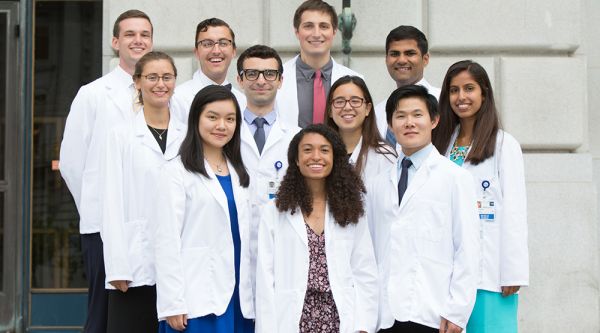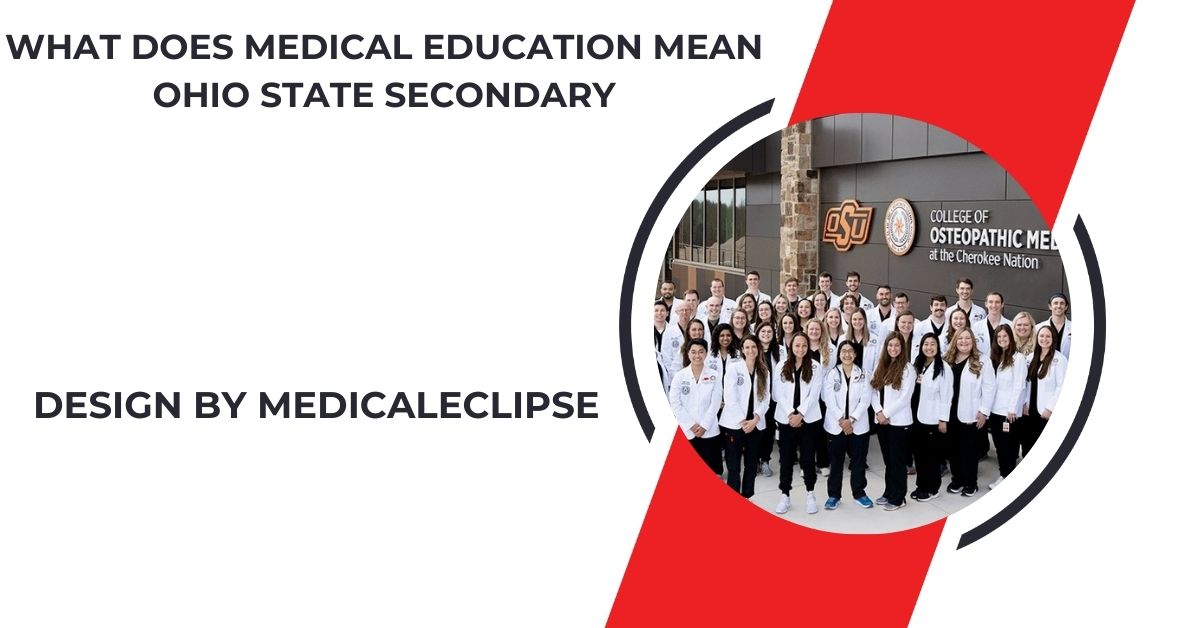Ohio State’s “medical education” question evaluates your understanding of medical training and how well your values align with their program. It’s an opportunity to show how OSU fits your goals.
In this article, we will explore what the “medical education” prompt means, why Ohio State asks this question, and how to approach it to make a strong impression in your secondary application.
Why Does Ohio State Ask About “Medical Education”?

Ohio State’s College of Medicine is committed to training physicians who will not only excel academically but also contribute meaningfully to the healthcare community. Their secondary application question about “medical education” serves several purposes:
Understanding Your Vision for Medical Training: Ohio State wants to gauge whether you have a clear, thoughtful perspective on what medical education should look like and how it supports your long-term career goals. They seek applicants who understand the importance of holistic, patient-centered education.
Evaluating Your Fit with Ohio State’s Program: This question helps the admissions committee determine whether your educational philosophy aligns with OSU’s values and mission. OSU values diversity, community involvement, and innovative medical education, and they want to see if you share these ideals.
Testing Your Self-Awareness and Critical Thinking: Ohio State wants to understand how you reflect on your own learning journey and how that reflection shapes your approach to becoming a physician. They are interested in applicants who can think critically about their education and articulate why a particular approach to training is important.
By answering the “medical education” question, you demonstrate not only your readiness for medical school but also your deeper understanding of the role that education plays in developing compassionate and competent healthcare providers.
How to Approach the “Medical Education” Question:
To craft an effective response, it’s essential to approach this prompt with a clear and organized thought process. Here’s a step-by-step breakdown of how to approach the question:
Reflect on What Medical Education Means to You:
Your first step is to think about your personal experiences in the healthcare field and how those have shaped your views on medical education. Consider these questions:
- What aspects of medical training do you value most? Is it the clinical exposure, hands-on learning, or perhaps mentorship?
- Have you had any experiences in medical settings that helped you form an opinion about what effective medical education should look like? This could include shadowing doctors, volunteering in healthcare environments, or working in a research lab.
- What are your long-term goals as a physician, and how do you see your education playing a role in helping you achieve those goals?
Once you have reflected on these points, define what you believe to be the most important elements of medical education. Is it a strong foundation in science and research? Is it learning through patient interactions and real-world clinical experiences? Do you value exposure to diverse populations and understanding healthcare disparities? These are all components of medical education that can form the basis of your answer.
Also Read: Regence Blue Cross And Blue Shield Durable Medical Equipment List – DME for Health Needs!
Link Your Vision with Ohio State’s Educational Approach:
Ohio State’s College of Medicine has several key features in its curriculum that may align with your vision of medical education. Take the time to research their program thoroughly, focusing on elements that resonate with your personal and academic goals.
Some aspects to consider:
- Patient-Centered Education: Ohio State’s curriculum emphasizes patient-centered care, meaning that medical students are taught to view each patient holistically, not just through the lens of their disease. If this aligns with your values, you can highlight how this type of approach appeals to you.
- Interdisciplinary Collaboration: OSU fosters an environment of collaboration, not only within the medical school but also with other health professions like nursing, pharmacy, and public health. If you value team-based care and believe that learning from other disciplines is critical to your growth as a physician, you should mention this.
- Research Opportunities: OSU is known for its strong research programs. If you have an interest in medical research, discuss how Ohio State’s research infrastructure would help you pursue this interest and contribute to the advancement of healthcare.
- Diversity and Inclusion: OSU places a significant emphasis on diversity in the student body and in patient care. If you have a personal connection to or commitment to addressing health disparities, highlight how OSU’s focus on diversity would help you contribute to the community and advance your goals as a physician.
Be Specific in Your Answer:

Admissions committees can tell when an applicant has written a generic response. Rather than using vague language like “I want to learn to help people,” aim for a more detailed and personalized answer. The key is to link Ohio State’s specific curriculum and values with your own vision of medical education. For example:
- Instead of saying, “I want to help people in need,” say, “I am passionate about addressing healthcare disparities, which is why Ohio State’s emphasis on serving diverse, underserved populations resonates deeply with me. I want to contribute to a healthcare system where all patients receive equitable care, and I believe that Ohio State’s community-focused approach will allow me to do that.”
- Avoid cliches such as “I’ve always wanted to be a doctor.” Instead, dive into why you want to be a physician and what aspects of medical education excite you most.
Discuss Long-Term Career Goals:
Once you’ve addressed your perspective on medical education, it’s important to tie that understanding back to your career aspirations. Whether you’re interested in primary care, research, surgery, or another field, explain how Ohio State’s program will help you achieve your long-term goals. Be specific about how you believe their training, mentorship, and resources will prepare you for your chosen career.
Show Enthusiasm and Authenticity:
Admissions committees want to admit students who are genuinely enthusiastic about becoming physicians. They want to know that you are excited about medical education and that you understand the demands and rewards of becoming a doctor. Be authentic in your response—let your passion shine through!
Tips for Writing a Strong Response:
- Be Concise: While it’s important to provide depth and clarity, make sure your answer is concise. Stick to the word limit and avoid unnecessary repetition.
- Use Personal Examples: Concrete examples make your response more compelling. If you’ve volunteered at a hospital, conducted research, or worked alongside physicians, mention specific experiences that have shaped your views on medical education.
- Align with OSU’s Values: Tailor your response to Ohio State’s mission and values. Use your knowledge of their program to make a connection between what they offer and your personal vision for your medical education.
- Proofread and Edit: A well-written, error-free response reflects your attention to detail. Make sure to proofread your essay for clarity, grammar, and spelling.
Common Pitfalls to Avoid:
- Being Too Generic: Generic responses like “I want to be a doctor to help people” do not show your true motivations or critical thinking. Take the time to reflect on your personal experiences and align them with Ohio State’s offerings.
- Overloading with Information: Be focused in your response. While you may have many thoughts on medical education, prioritize the ones that are most relevant to Ohio State’s program and your personal goals.
- Failing to Research OSU: Admissions committees can tell if you haven’t researched their program thoroughly. Mention specific features of the program that attract you, such as their curriculum, faculty, or clinical opportunities.
FAQ’s
- Why does Ohio State ask about “medical education”?
Ohio State wants to assess your understanding of medical training, your educational philosophy, and whether your values align with their curriculum and mission.
- How should I approach the “medical education” question?
Reflect on your personal experiences, connect them to OSU’s values, and be specific about how their curriculum aligns with your goals.
- What should I avoid in my answer?
Avoid generic responses and vague statements. Focus on providing specific examples that demonstrate your understanding of medical education.
- How can I align my answer with Ohio State’s values?
Research OSU’s patient-centered care, interdisciplinary collaboration, and diversity initiatives, then connect them to your vision of medical education.
- Why is authenticity important in my response?
Authenticity shows your genuine enthusiasm for the field and helps convey your sincere passion for becoming a physician.
Conclusion
The “medical education” question in Ohio State’s secondary application offers a chance to demonstrate your understanding of medical training and how it aligns with OSU’s values. By reflecting on what medical education means to you, linking your goals with OSU’s curriculum, and expressing your enthusiasm, you can create a compelling response. Best of luck with your application!

Leave a Reply